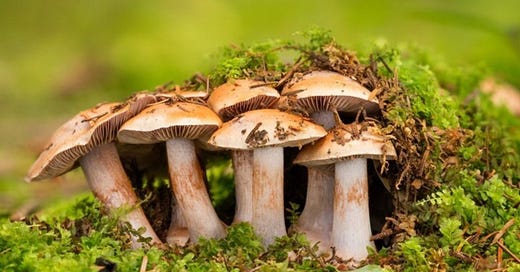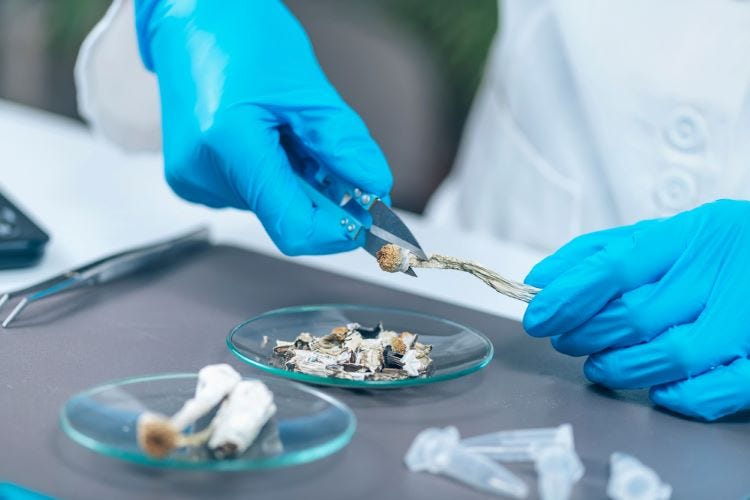Hey there, Fungi Friday fam,
Congrats, you’ve made it through yet another week! I’m traveling this week, so sitting down to write this a few days early (hence the lack of additional articles at the end of this feature), but that doesn’t mean we don’t have a couple solid reads for you once again. So let’s get into the them!
Life From Death Are What Fungi Are All About
Whenever we put out trash for disposal, there is always someone to collect the garbage. On zooming out, we realize that when it comes to handling the waste of an entire city, we have to depend on our landfills and the people running the waste management infrastructure. Now imagine this on a much larger scale and you get fungi, the kingdom of organisms that take care of waste management in nature. Fungi are the world’s decomposers and they are responsible for turning dead organic matter into new life.
For feature number one this week, let’s break down the long and complex history between fungi and animals. If you were wondering what fungi do, they are master decomposers that keep our forests alive. If we did not have fungi to help in decomposition, all life in the forest would be buried under a humongous build up of dead plant matter. Fungi have the ability to break down this dead organic matter and by doing that, they release nutrients. Plants then use these very nutrients to help them in their growth.
The history of fungi dates back an estimated to be 2.4 billion years, found in lava records from South Africa. And would you believe that animals may have come from fungi? It is estimated that we divided from this kingdom roughly 650 million years ago, where one branch led to fungi and the other to animals. This would mean that we humans are more closely related to fungi than to any other kingdom, descending from mycelium.
Another crazy fungi stat, mycelium can theoretically live on forever. This is why the oldest and largest living organism is a fungus. How large? The Armillaria ostoyae species found in Oregon measures 9 square kilometres!
Fungi have also played a significant role in evolutionary history, especially for mammals. When an asteroid struck Earth 65 mya, mammals had an advantage over reptiles due to their warm-blooded nature. In fact, the mammals who survived the pressure of fungal diseases back then are the ancestors of every currently living mammal on the planet. It is fungi that we warm-blooded mammals owe our resilient evolution to.
Life on Earth today owes a lot to this remarkable kingdom. Fungi convert dead plants and animals into essential nutrients that enable the growth of new organisms. Even though us humans have a fearful perception of death and view it as a finality, it is the fungi kingdom that demonstrates how significant death is to recreate life and we have much to learn from them.
Psilocybin improves depression symptoms, study shows
Would you look at that, another study claiming that a single dose of psilocybin alongside psychological support, can greatly reduce symptoms of treatment-resistant depression!
The multi-centre, Phase IIb trial observed the severity of depression in 233 individuals over 12 weeks in 22 sites and 10 countries across Europe (Czech Republic, Denmark, Germany, Ireland, the Netherlands, Portugal, Spain and UK) and Canada and US between 1 March 2019 and 27 September 2021.
Researchers randomly allocated patients 25mg, 10mg and 1mg doses of the drug. Those who received the 1mg dose acted as a control group. Patients given 25mg of psilocybin reported greater depression symptom relief than individuals given the lowest 1mg dose.
Dr Guy Goodwin, Chief Medical Officer for COMPASS Pathways stated: “We saw positive results in a particularly difficult to treat group of patients and the highest dose of psilocybin had the greatest impact on people’s depression…[the] finding is critical for it to be recognised as a new treatment option in the future. We look forward to starting our Phase III program later this year.”
Want even more? Here are some other interesting, mushroom focused reads of the week:
As always, thank you for reading this weeks edition of Fungi Friday’s! If you enjoyed what you found, please feel free to forward to friends also interested in the Fungi Community!
And if you were forwarded this post and enjoyed what you found, please subscribe below:



